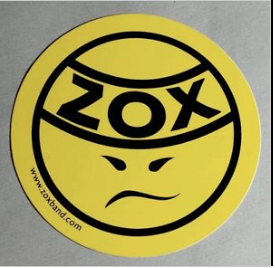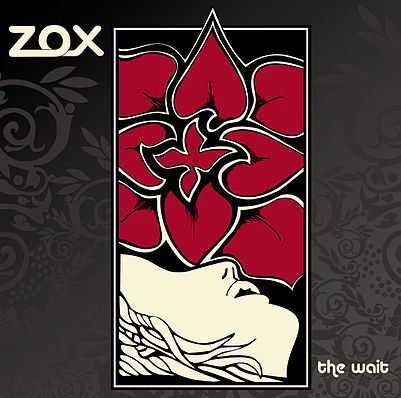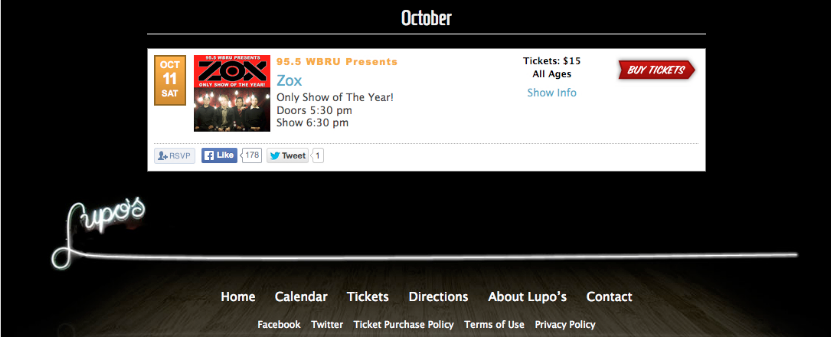As long as I’ve been in Rhode Island, I’ve seen this sticker plastered on just about every stop sign, wall and loading dock door from Narragansett to Woonsocket:
and frankly, I didn’t know what it meant for the first few years of being in the state while attended college.
I had always seen it around, but was never really compelled to check out what it meant or what it stood for. I just knew it was everywhere.
It was about as everywhere as this sticker was:
It wasn’t until a couple of friends and myself were rehearsing our band together and jamming out in our drummer’s basement back in Connecticut do I then remember seeing that sticker plus a sticker of what I later found of was a sticker of Zox’s second album, The Wait, on the wall of his basement.
That’s what finally spurred the question: what is ZOX?
My friend told me Zox was a band – and a damn good one at that.
He went on to say that the band was made up four guys from Rhode Island, drummer John Zox, guitarist Eli Miller, bassist Dan Edinberg and violin player Spencer Swain and their style of music was somewhere between reggae rock, indie music and jam rock.
He loaned me his copy of The Wait to listen to which I took home that afternoon after practice and listened to that night. At first listen, I knew there was something special here. I The recording sounded so full, rich and colorful. All the instruments were clear and came across very balanced and well mixed in the recording. The guitars were reminiscent of just about every Bob Marley or Burning Spear record that I had heard or owned, the drums – both the way they were recorded and the way they were played – reminded me of the way Bud Gaugh from Sublime played on all the band’s albums and the violin was so sweet and silky, complimenting each track.
Above all else: the bass was loud.
I later found out that the name of the band’s bassist was Dan Edinberg but all I knew at the time was that I was really into the bass playing on that album and later the entire Zox catalog.
Moreover, as a budding bass player, having music that had loud, intricate, melodic bass playing that wasn’t on a Weather Report album, a Rush album or a Yes album was a big thing to me. Who was this guy, I wondered.
Oh – and then there was the violin.
It wasn’t until that album did I realize how good reggae could sound with a violin.
Even now when I go back and play ‘Take Me Home’, it still gets me how fantastic Swain’s violin playing sounds in the mix and how well it compliments the rest of the band at the song as a whole.
That was my first encounter with the band Zox, a band that I’m glad I love as much as I do and really marvel at the fact that not many people do know about them – even here in Rhode Island.
Now, fast forward to a few weeks ago to when I was getting settled back in Rhode Island after a stint in North Carolina for work and volunteer service and wanted to see what acts were playing around Lupos Heartbreak Hotel and The Met in Providence and Pawtucket respectfully.
Unfortunately, nothing on the roster of artists for the next few months seemed particularly exciting, except for one show way at the bottom of the screen in October:
Zox was coming back for one show? And for only 15 dollars!?
Needless to say, I bought my ticket right away and called my friends – also Zox fans – about the show and they promptly purchased their tickets as well.
Since that time my friend loaned my his copy of The Wait, Zox bassist Dan Edinberg was always one of those bassists that I wish I had the chance to see live.
Since the band’s break up in 2009, I had always wondered what it would have been like to see this band live and hear Dan’s playing in person.
The band’s three studio recordings, Take Me Home, The Wait and Line in the Sand, were produced so well that any one can hear Dan’s bass come through the mix in full, punchy force that to to have heard these bass lines performed live would have been just as much a treat for the fan of the band’s music as would be for any fan of good bass playing.
While Zox did break up in 2009 and the other three members pursued other musical endeavors, Dan began a new project called The Stepkids, a psychedelic, funky electronic project with drummer Tim Walsh and guitarist Jeff Gitelman.
The band since 2009 has signed to Stones Throw Records in California and released one self titled full length album in 2011 and as of a few days ago (it will be a ‘few days ago’ when the story drops) released an EP called Wanderers.
I had a chance to talk to Dan via email about the upcoming Zox show in October, his musical roots and how he got his start on bass, his work with the Stepkids and what are some of his fondest memories with Zox.
– – –
ME: When did you first start playing bass? How did you first get into the instrument? Who were some of your early influences and motivators for getting started with the instrument?
DE: I first started playing bass when I was 14, in 1994. I went into a music store and figured out how to play “About A Girl” by Nirvana. I studied piano and violin from ages 8-14 so picking up bass wasn’t much of a stretch from there.
My father is a jazz pianist and my brother is a 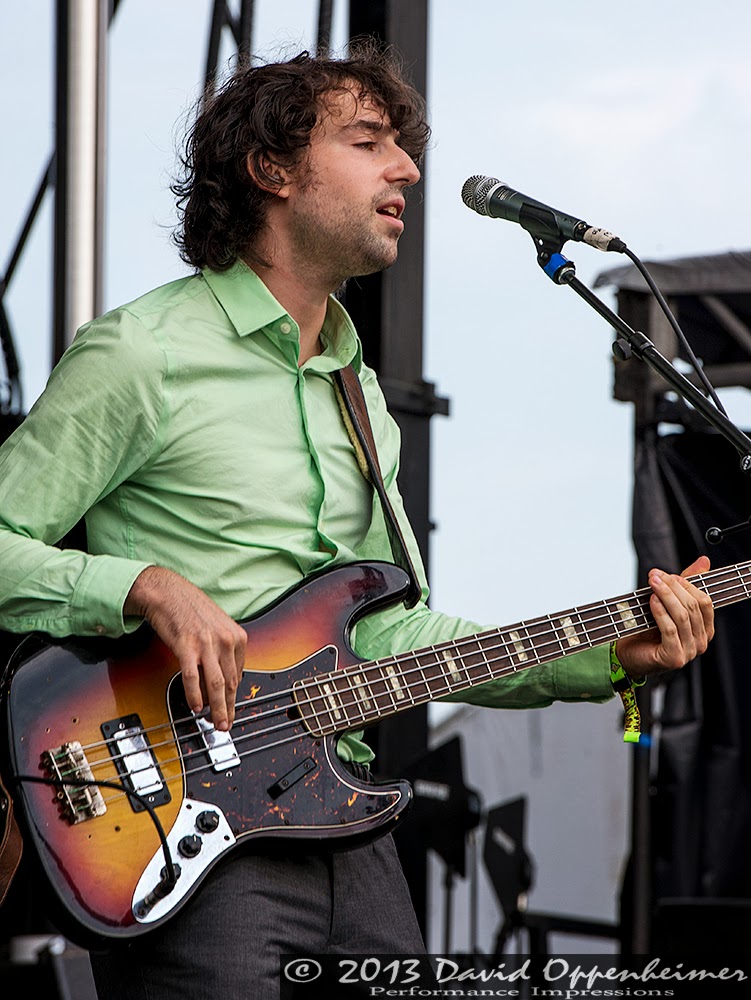 saxophonist so I wanted to play bass to have a trio with them.
saxophonist so I wanted to play bass to have a trio with them.
Plus when I saw the video for Queen’s “Bohemian Rhapsody” and saw that one of the guys was playing his guitar with two fingers that struck me as odd but also as a new way I could play my violin in the middle of orchestra class.
My biggest early influence is unquestionably my first electric bass teacher, Steve Clarke of Bridgeport, CT.
I had never before been exposed to the advanced techniques of R+B, Gospel, funk, and jazz electric bass before and my 14-year-old mind was blown when he showed me Marcus Miller, Jaco Pastorius, and James Jamerson.
The biggest lesson for me by studying with him was that holding down a groove, no matter what instrument or style you play, is the most important thing.
ME: How has your playing evolved since you first started playing?
DE: I’ve always gone in phases – at any given moment I’m usually obsessed with some musician deeply and am trying to absorb his/her techniques.
I started as a classic rock/grunge rock fan in 1994 but quickly shifted to jazz, R+B, funk.
I was raised on jazz music by my father’s record collection since I can remember so playing bass really got me back into my roots.
I started playing upright bass when I was 15 and then I spent the next 7 years obsessing over Jimmy Garrison, Paul Chambers, Ron Carter. When I was 23 I joined Zox, and that opened me back up to the great rock bassists: John Paul Jones, Paul McCartney, Keith Richards (yes he is a great rock bass player who played on a substantial amount of Stones recordings), Phil Lesh.
ME: What does your practice routine look like these days? How has it changed since you first stared playing?
DE: ”Practice” for me is a lifestyle and it has definitely changed over the course of my playing career.
I spent years practicing only electric bass, then years practicing only upright bass, and for the last few years I’ve been practicing being a producer every day – mixing and engineering records, practicing keyboard skills, practicing singing – but when I can I still run my scales on the upright daily and run through a jazz standard.
ME: First and foremost I have to ask: why just one show? What prompted yourself and the other ZOX members to get together for this show?
DE: We all were going to happen to be in Providence at the exact same time that weekend so we thought that this would be an unforgettable opportunity.
We haven’t done a reunion show in 3 years – it is time!
We’d do more shows but everyone lives far apart from each other so making it happen schedule-wise is usually impossible in the first place (we are lucky enough that we were able to all commit to this one show…).
ME: I’m very curious to know more about the history of ZOX. How did you first meet John, Eli and Spencer? How did ZOX first become the ZOX fans all know?
DE: I met Eli in the first week of college at Brown University in 1998.
He wanted to start a pop band. I totally wasn’t into pop music at the time – I wanted to study jazz music and form an underground R+B type band.
So we jammed a little bit but he eventually went his separate way and founded Zox shortly after. John happened to live in his dorm (I believe) and they went through a bunch of incarnations but eventually they settled on the lineup of Eli, John, Spencer, and Eli Batalion on bass, who all recorded the album Take Me Home.
Eli (Batalion) is a very good friend of mine – we actually went on an Israel trip together in 1997.
By 2003 I had changed my musical perspective (something that continually happens to me) and had started producing tracks and writing songs, and finally understood how great pop music can be.
When Eli (Batalion) decided to leave Zox, I was a fan of the album Take Me Home, so I auditioned and the rest is history.
ME: What was the song writing process like for ZOX?
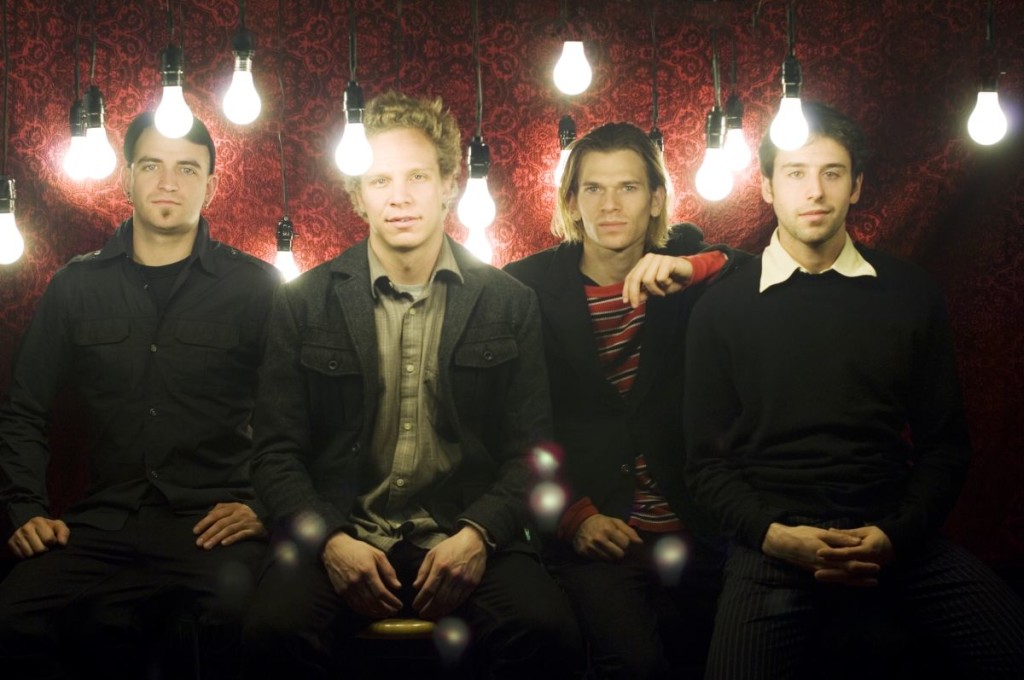
DE: Eli Miller is a fantastic songwriter – most of the time he would come to rehearsal with a song fully written and then we would deconstruct the chords and write parts together. Sometimes we would make vocal melody suggestions but usually the songs were complete – which is the sign of a great writer! For the album Line In The Sand, Eli and I co-wrote a few songs by him singing over beats I had already made (“Line In The Sand”, “Towards Los Angeles”), and I wrote a song myself (“Another Attack”).
ME: How do you remember rehearsals with ZOX?
DE: I’m sure the way any band members remembers rehearsals – they can be pretty emotional because everyone cares so much.
With Zox, this was our full-time job, so we really put in our all to it.
Before we recorded The Wait and Line In The Sand, we would rehearse every day for 8 hours.
That of course can get tiring, frustrating, arguments can ensue, people might not even want to be there, but at the end of the day, the hard work pays off.
That’s what I take away from it – the more work you put in, the more you struggle, the more you get out of it. Every time we would play a show I knew we were completely ready.
That’s the best feeling you can have going into a performance or a recording.
ME: ZOX’s tenure together seemed relatively short lived. You guys were together for 7 years and released 3 albums, all to mostly positive reviews, and the ZOX name seems to resonate so strongly with Rhode Island. What caused the breakup?
DE: Just us growing up! We had toured so much much for so long and it was time to stop the incessant touring. Personally we all love each other and there were no hard feelings.
We just felt like it was time to move on to other things in our own individual lives.
ME: What is the story behind the ZOX logo? Even these days, when I’m walking around Providence, Warwick or even the University of Rhode Island’s campus, I still see the ZOX logo stickered on a wall or stop sign and it’s definitely one of the most recognizable band logos I can think of.
DE: I wish I could recollect the name of the person who designed it – I love this logo. 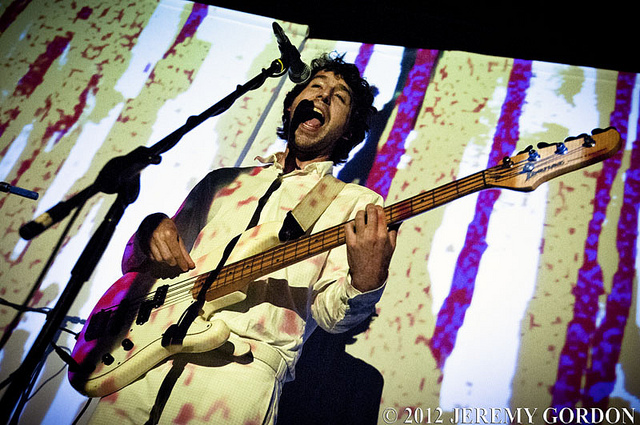
Having a great, iconic logo is so hard to do.
That was one of the things that really impressed me with Zox before I even joined – how they had a keen sense of marketing themselves, which is something great musicians rarely do.
ME: What are some of your fondest memories as a member of ZOX? What was one of the most memorable gigs you ever played?
DE: My favorite shows were always the ones that you didn’t expect to be great – playing random places in small town USA where out of nowhere a super-dedicated fanbase would show up and go wild.
Shows in Des Moines, Cincinnati, Dallas, for example. But of course, it was always playing at Lupo’s in Providence that sticks in my head as the highlights. Every one of those shows – there’s no better feeling as a performing artist than hearing 2,000 people sing along to your songs.
ME: After ZOX, you went on to form the Stepkids with Tim Walsh and Jeff Gitelman and still seem to be active with the band. How did the Stepkids form? How does being part of the Stepkids it differ from your experiences playing with ZOX? How is it similar?
DE: Jeff and I had been playing music together since 1998.
We met in Connecticut as working jazz musicians and stayed in touch since then, always hoping to form a project. I was regularly going to Boston while in college to play jazz and RnB sessions with Jeff and other musicians from Berklee School of Music and New England Conservatory.
So far before I was in Zox, Jeff and I were scheming of how we could have a great band. Jeff went off to tour with Alicia Keys, Bobby Brown, and Lauren Hill (and a bunch of other great artists) while I was in Zox, and after Zox called it a quits in 2008, Jeff had also tired of only backing up other artists.
He wanted to do something different than modern R+B, and I wanted to do something different than modern indie-rock. He introduced me to Tim Walsh, who had a studio space, is a great engineer, and a great drummer/singer to boot.
So we formed The Stepkids, which existed to us in the stylistic sphere between modern R+B and lo-fi rock.
It felt like an all-star band in a way I’d never experienced before – everyone in the band produces, engineers, songwrites, sings, and plays every instrument.
We recorded 2 albums all on our own and those experiences made me the producer I am today.
I see my experience in The Stepkids not so much as a different thing from my experience in Zox, but rather as a continuation of what I’ve learned as a musician.
ME: How has your bass playing changed from ZOX to the Stepkids? Do you find yourself thinking differently about crafting solos and bass lines in the context of the Stepkids versus being part of ZOX?
DE: These are bands that play different styles of music, and I’ve always been a bassist who thought of myself as a chameleon who can play many different styles, so in both of those bands I’m trying to do the best job within the context of what the bass can or should do.
So with Zox I’m really trying to anchor down the song and play simple, catchy basslines.
With The Stepkids, because we are so funk- and jazz-influenced, I’m able to stretch out more on the bass, so in that sense I’ve in a way gone back to being that wide-eyed 14-year-old who bugged out when he first heard Jaco Pastorius.
ME: I had also heard that ou recently were selected to be one of the judges for the WBRU rock hunt a few months ago. How did you get involved with that? How was the experience?
DE: My friend Michelle Marchetti was helping to select the judges, and she and I go way back – she helped tour manage Zox some back in the day and we’ve remained friends.
Being that Zox is a former Rock Hunt winner, and the fact that us winning the Rock Hunt really did set us up well to keep touring and eventually sign with SideOneDummy Records, I was honored to come full circle and be a judge.
It is great how the judges take it very seriously – every band was listened to completely. I hope the bands got the pieces of paper with our written feedback, because I wrote a novel for each of them!
- How to Set up a Pedal Board for Bassists - June 16, 2021
- The Best Bass Guitar Effects Pedals Guide You’ll Ever See [INFOGRAPHIC] - April 24, 2020
- The Ultimate Beginner’s Guide to Everything About Bass Guitar Strings - March 20, 2020
